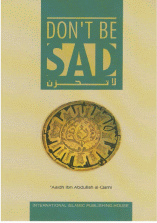Don't be Sad

Beware of ardent love
Beware of falling in love with appearances; such love is beset with anxiety and perpetual misery. It is a blessing for a Muslim that he stays away from messages found in lyrics and music, messages about ardent love, unrequited love, or separation from one's object of love.
(Have you seen him who takes his own lust [vain desires] as his [god], and Allah knowing [him as such], left him astray and sealed his hearing and his heart, and put a cover on his sight.) (Qur'an 45: 23)
In reproaching himself, an Arab poet wrote the following:
"l am the one who has brought death a knocking, Then who is to blame when the murdered is the murderer."
He is blaming himself for the perpetual pain and misery that he experienced, finally recognizing that by falling in passionate love --- and then by not being able to fall out of it --- he alone was to blame for his woes.
(And if an evil whisper comes to you from Satan then seek refuge with Allah.) (Qur'an 7: 200)
(Verily, those who are Al-Muttaqo0n [the pious], when an evil thought comes to them from Satan, they remember [Allah], and [indeed] they then see [aright].) (Qur'an 7: 201)
Ibn al-Qayyim expounded on this topic in his book The Disease and the Cure. He mentioned a number of factors that contribute to one falling hopelessly and uncontrollably in love. Among them are the following:
- An empty heart that is bereft of love for Allah, remembrance of Him, and fear of Him.
- Allowing one's eyes to wander and stare. The eye is a scout that can bring back misery to the heart.
(Tell the believing men to lower their gaze from looking at forbidden things].) (Quran 24: 30)
A look is an arrow from the arrows of the Devil. An Arab poet said:
"When you allow your eyes to wander ahead as a scout, Looking at all eyes and stares will then follow, Seeing that which you are not capable of embracing completely, While not being patient for getting something partially."
- being negligent in worship --- especially in remembrance, supplication, and prayer.
(Verily, As-Salaat (the prayer) prevents from Al-Fahsha [i.e. great sins of every kind, unlawjul sexual intercourse, etc] and Al-Munkar [i.e. disbelief polytheism, and every kind of evil wicked deed, etc.)
(Quran 29: 45)
